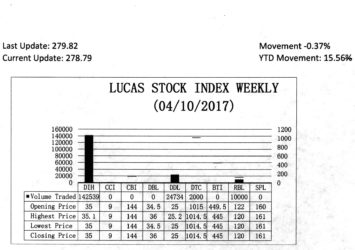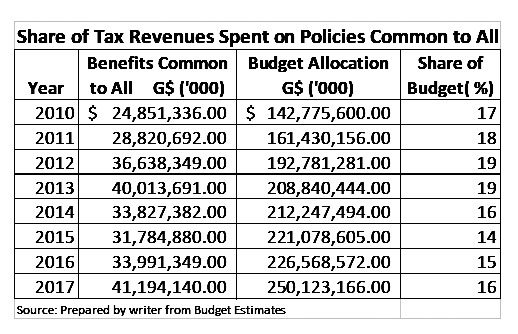Of late, there has been plenty angst expressed about taxes, and in some cases it was accompanied by an open show of concern using the democratic means of protest. Much of the passion has been directed at the adjustment to fees and the decision of the government to widen the tax base using the value-added tax. There will always be merits and de-merits for taking such a course of action, for the interests of taxpayers are never homogeneous. One therefore has to be careful in examining and evaluating the mouthing and actions taken by persons with respect to tax issues. In the end, it is the impact of government service and support given to the taxpayers that will matter. The perspective of interest that emerges from the concerns expressed is usually the benefit that taxpayers receive for the taxes that they pay. The benefits that taxpayers receive are not all the same and are usually determined by the policy goals of the government which in themselves are determined by the level of development of the country, the economic and social condition of the people and the quality of its institutions. Some benefits are described as being common to all persons while some are considered to be special to all. Other benefits are thought of as being special to some people.
Negative attitude
The taxes that people pay are usually distributed along those lines and are reflected in the budget allocation and spending by government. Quite often, it is the benefits that are special to some people that raise hackles about taxation since it often seems to contradict the benefits principle of taxation. The benefits principle of taxation refers to the need for the persons or businesses which are recipients of most of the government’s money to contribute the most taxes to government’s revenue. Quite often that concern translates into a negative attitude towards paying taxes by those who think that they are not getting enough benefits.
Access to benefits comes under three policy perspectives. The three policy emphases matter to taxpayers and it is useful to discuss them so that people understand that the benefits of taxation were never intended to be equal among everyone. Issues of equity and justice enter the picture, even if they do not matter to everyone. Discussing these issues would also provide some clarity as to whether the greater benefits are really going to those who do not deserve them. This article will examine and compare the trends in spending on benefits that were available to the taxpayers of this country on account of public expenditure made during the period 2010 to 2017. It will look specifically at the share of benefits that was common to all Guyanese, those that were special to all Guyanese and those that were special to some Guyanese. Given the complexity of the subject matter, the information will be presented in more than one part.
Budgetary allocations
Policy analysts who discuss government spending make their assessments about policy and its benefits on the basis of budgetary allocations, the things that government spends its money on. There are essentially two ways in which a country allocates resources. One way is to use the market and the other is to use the national budget. They are both used in Guyana and compete for the same resources. The government usually has the upper hand with the power of compulsion and utilizes that power through its tax laws to get its share of the income. The government’s share of the resources is usually reflected in the tax level which is the share of gross domestic product (GDP) that goes to the government. It is also a reflection of the proportion of income that each taxpayer gives up from all the various taxes that he or she encounters.
A greater allocation to the government means less to the private sector. There is need for both the public and private sector to work towards the proper operation and management of the economy. The market is often thought to be the most rational and efficient way of allocating resources. It reflects the decisions of those who matter, the people. Through their purchasing decisions, people decide how resources will be allocated and for what purpose. But very often the market fails and is unable to deliver the goods or services at a price or in a manner that is most cost effective or even convenient to the people. Government steps in and fills the void and tries to ensure the general welfare of the society is improved by making the goods and services available. Instead of having none, people at least get some.
An example that often comes up is that of electricity. Many would recall that GPL was privatized and the private company returned it to the government since it could not make a reasonable return on the investment. Instead of leaving people without electricity, the government took it over. Similarly, operating a drainage and irrigation system is not that profitable to a private entity. Government generally bears the cost so that communities dependent on the infrastructure can function and even conduct private enterprise of farming using the national drainage and irrigation system. However, government is often criticized for being inefficient. Part of the inefficiency comes from a need to comply with laws and accounting procedures aimed at protecting the resources taken from the people. At times, compliance can lead to delays. Government could also distort the benefits of the service by making decisions favourable to those in power or those who can use money or other inducements to influence management decisions.
Policy descriptions
Typically, benefits that occur as a consequence of government intervention come from the operation of three groups of policies. These are known as the substantive policies,

The Lucas Stock Index (LSI) fell 0.37 per cent during the second period of trading in April 2017. The stocks of four companies were traded with 179,273 shares changing hands. There were no Climbers and two Tumblers. The stocks of Demerara Tobacco Company (DTC) fell 0.05 per cent on the sale of 2,000 shares and the stocks of Republic Bank Limited (RBL) fell 1.64 per cent on the sale of 10,000 shares. In the meanwhile, the stocks of Banks DIH (DIH) and Demerara Distillers Limited (DDL) remained unchanged on the sale of 142,539 and 24,734 shares respectively.
the distributive policies and the re-distributive policies. Substantive policies are common to all who are within the country. Activities of government that normally fall under substantive policies are those dealing with public security, the defence of the country and its overall administration. The public safety and security are services that are available to all persons in the country, including foreigners who might be working or visiting the country. They all have a right to be safe in the country and to expect the police to respond to any security concern that they might have. The same applies in general to the overall protection of citizens and the administration of the affairs of the country. One does not have to ask for the intervention of the police for them to provide a service. The police drive around patrolling areas whether residents ask for the patrols or not. The Ministry of Foreign Affairs does not have to be asked to defend the territorial integrity of Guyana. It must do it if Guyana is to exist as it is now known. That means the work of the Foreign Ministry to protect the territorial integrity of the country is a substantive policy issue which is common to all. Based on the foregoing example, the substantive policies of government can be identified also with the work of the Ministry of Presidency, the Office of the Prime Minister, the Ministry of Public Security and the Guyana Defence Force and any other safety and security service that is controlled by the government. It is necessary to include the work of the Parliament since that body passes laws that govern everyone whether people like it or not.
TABLE 1
Table 1 above gives an indication of the amount of taxes that are used to provide benefits that are common to all persons. It could be seen from the table that an average of 17 per cent of the annual budget is spent on benefits that accrue to all Guyanese. Within the period 2010 to 2014, government spent an average of 18 per cent of the budget on benefits that were common to all. However, that share had declined to 16 per cent in 2014. There was a sharp decline in the allocation in 2015, but it has been progressively increasing since then. This is a clear indication that the government is aware and concerned about the deterioration of public safety and security in the country. The complement to the current allocation is that an estimated 82 per cent of government spending is on policies that are special to all and special to some people. Apart from complaints about performance or misconduct particularly of the police, politicians are the ones who fuss about benefits that are common to all.
The issues of greater concern are the benefits that are special to all and those that are special to some.
(To be continued)
Happy Easter!











